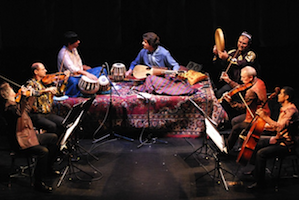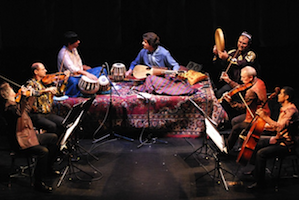
Photo by Rachel Bleckman
San Franciscan musician-music critic Alexandra Ivanoff, who lives in Istanbul, popped over to New York and attended Lincoln Center concerts of the 40-year-old Kronos Quartet, of four other much-traveled San Francisco residents.
From her report in Today's Zaman where she has a regular column:
The Kronos Quartet is not your average string quartet. The only traditional thing about the group is its standard instrumentation: two violins, one viola, and one cello.Kronos started 40 years ago in Seattle, Washington, then migrated to San Francisco as a home base. Their mission, from the beginning, was to stretch the string-quartet genre's boundaries far beyond Beethoven and Haydn. What makes them unique is their commitment to creating and performing an enormous body of work that draws on other musical genres and technology's continuously changing spectrum.
Three of the four are original members, only the cellist has changed over the years. Violinists David Harrington, John Sherba, violist Hank Dutt, and cellist Sunny Yang have become their own musical industry over the decades. To honor their four decades of innovation, they were feted at New York's Lincoln Center from July 24-28 with "Kronos at 40," the opening feature of the annual Lincoln Center Out of Doors festival (which continues through August 11).
To celebrate the scope of the ensemble's 40 years, Director of Public Programming for Lincoln Center Bill Bragin curated a multicultural, eclectic five-day blitz that blanketed all the outdoor spaces in Lincoln Center. The quartet was the centerpiece of, or the source of influence for, 24 separate performances over five days. The wide range of musical activities included Afrobeat, avant-garde, marching band, new works, electronic, the Brooklyn Youth Chorus, film scores, audience participation, and artists from African countries, Korea, Ireland, China, Vietnam, Greece, and Ukraine.
The first evening concert, directed by Stuart Bogie, actually took the spotlight off Kronos in favor of celebrating the legacy of Nigerian musician Fela Anikulapo Kuti (1938-1997). The spirit of the multi-instrumentalist pioneer of Afrobeat and human rights activist took center stage in Red Hot + FELA LIVE!. Twelve artists, including Kuti's longtime drummer Tony Allen, with the seven-member group Superhuman Happiness, and only tangentially the Kronos Quartet, paid homage to Kuti's vibrant music and defiant spirit.
Before the Kuti set, Superhuman Happiness performed excerpts from Bogie's film score to How To Survive a Plague with Kronos participating; before that, the Mark Dendy Dance and Theater Projects presented the world premiere of Ritual Cyclical on outdoor stages, accompanied by nine recorded selections from Kronos' extensive discography. This was a reminder that Kronos' long career is marked by numerous participations with dance companies and choreographers like Merce Cunningham, Paul Taylor, Twyla Tharp, and Eiko and Koma.

